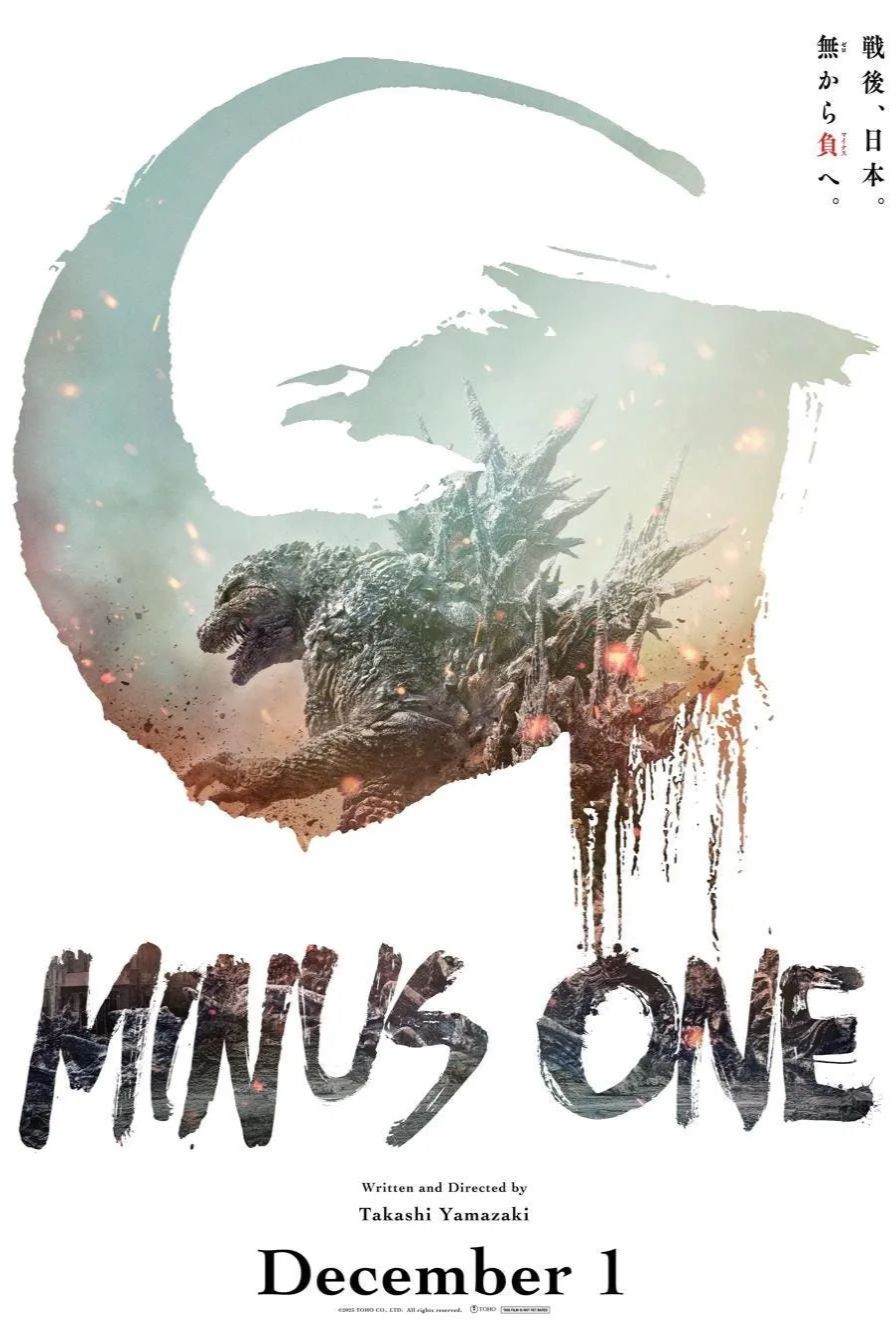Godzilla Minus One, the latest cinematic spectacle featuring the King of the Monsters, boasts a title that is as intriguing as the film itself. As audiences emerge from screenings, captivated by Godzilla Minus One‘s ending and its return to the franchise’s powerful roots, the question arises: why “Minus One”? Moving away from the sprawling narratives of the Monsterverse and embracing a more focused, thrilling monster movie experience, Godzilla Minus One has garnered critical acclaim, celebrated as one of the best monster films in recent memory.
One of the standout aspects of Godzilla Minus One is its compelling human narrative. In a departure from recent Monsterverse installments, the film prioritizes and elevates its human characters, adding emotional depth and resonance to the monstrous chaos. Beyond its narrative strengths, Godzilla Minus One also distinguishes itself with its thought-provoking title. While initially enigmatic, the film’s story quickly illuminates the profound meaning embedded within this unique subheading, revealing layers of significance that resonate with the movie’s core themes.
The True Meaning Behind “Godzilla Minus One”
Reflecting Post-War Japan: A Nation at Zero
The title Godzilla Minus One is deliberately chosen to represent the devastated state of Japan in the aftermath of World War II. Having endured the horrors of the war, culminating in the atomic bombings of Hiroshima and Nagasaki, Japan found itself at its nadir – a nation reduced to zero. The 1940s were a period of immense hardship as the country grappled with rebuilding and restructuring amidst widespread destruction and profound loss. It is in this context that Godzilla emerges, not merely as a monster, but as a force that further exacerbates Japan’s already precarious situation. Therefore, the subtitle “Minus One” signifies that Godzilla’s catastrophic attacks push the nation below zero, plunging it into an even deeper abyss of despair and devastation.
Godzilla’s genesis as a concept is deeply rooted in the anxieties surrounding nuclear warfare. His rampages across Japan serve as a potent metaphor for the unspeakable horrors of war and its lasting impact on both the physical landscape and the collective psyche of a nation.
The true essence of the Godzilla Minus One title lies in understanding what Godzilla embodies within the film and what the Kaiju has traditionally symbolized in Japanese cinema, particularly outside of the Monsterverse timeline. While Western interpretations, like the Monsterverse, have sometimes softened Godzilla’s destructive nature, Godzilla Minus One firmly reconnects with the original allegory. Set in 1945 Japan, the film deliberately revisits Godzilla’s role as a metaphor for nuclear devastation and the broader terrors of conflict.
Connecting “Minus One” to the Narrative
Godzilla’s Terrifying Nature Amplifies the Title’s Significance
The connection between Godzilla Minus One‘s title and its storyline is intrinsically linked to Godzilla’s portrayal. In recent Western media, particularly within the Monsterverse, Godzilla has often been depicted as an anti-hero, a force of nature with a protective instinct towards Earth, rather than the purely destructive entity he is traditionally portrayed as in Japanese filmmaking. However, Godzilla Minus One deliberately harkens back to the classic depictions, where Godzilla’s actions are not those of a benevolent guardian, but the devastating rampages of a colossal, terrifying monster driven by primal instinct. These actions, as mentioned, serve as a powerful metaphor for the horrors of war, contrasting sharply with the Monsterverse’s more heroic interpretations of the Kaiju.
By returning to this original, darker interpretation of Godzilla, Godzilla Minus One effectively illustrates the sheer devastation that the iconic monster can unleash. In this film, Godzilla possesses none of the heroic traits seen in the Monsterverse movies, which are arguably ranked lower within the franchise by many fans and critics. Instead, he is a force of utter ruin, bringing calamity and despair to the characters and to Japan as a whole. This depiction of Godzilla perfectly mirrors the “Minus One” aspect of the title, lending profound meaning to the film’s perspective on Godzilla and reaffirming what the Kaiju has always represented in its most impactful Japanese iterations.
“Godzilla Minus One”: A Title Unlike Others
Deeper Meaning in a Title: A Rarity in Godzilla Films
Beyond its critical success and status as one of the best monster movies in recent years, Godzilla Minus One‘s distinctiveness within the Godzilla franchise is undeniable. This extends to its title, “Minus One,” which, as we’ve explored, carries a far deeper meaning than is typical for Godzilla films. Traditionally, Godzilla movie titles are remarkably straightforward, offering audiences a concise and simple summary of the film’s premise. The earliest entries, such as Godzilla (1954) and Godzilla Raids Again (1955), exemplify this approach, providing succinct encapsulations of each movie’s basic concept.
Many subsequent Godzilla films involve the monster battling other Kaiju, and their titles often directly reflect this, prioritizing simplicity over deeper thematic resonance.
Over time, many Japanese-produced Godzilla installments have maintained this direct titling convention. Numerous films center around Godzilla clashing with other giant monsters, and the titles typically reflect this conflict without delving into deeper layers of meaning. Titles like King Kong vs. Godzilla, Mothra vs. Godzilla, Godzilla vs. Hedorah, and Godzilla vs. Mechagodzilla are prime examples, each clearly indicating the central monster showdown of the respective film. The same principle applies to American-made Godzilla movies, from Godzilla: King of the Monsters to Godzilla vs. Kong. In contrast, Godzilla Minus One presents a title that is significantly more thought-provoking and conceptually richer.
The Perfection of “Godzilla Minus One”
A Title that Embodies Story, Characters, and Themes
The brilliance of Godzilla Minus One‘s title lies in its profound meaning. The film presents a stark and bleak portrayal of Godzilla’s attacks, interwoven with powerful themes of war, loss, and societal devastation. These somber themes converge under the succinct title “Minus One,” effectively encapsulating how the film uses Godzilla as an allegory for a nation grappling with unimaginable trauma. This thematic depth elevates the title, making it as impactful and resonant as the film itself, aligning with the overwhelmingly positive reception it has received.
| Godzilla Minus One’s Reception |
|---|
| Critical Rotten Tomatoes Score |
| 98% |
Similarly, Godzilla Minus One‘s title achieves perfection by both diverging from and fitting within the established pattern of past Godzilla titles. As previously noted, traditional Godzilla titles offer a brief, easily understood summary of the film’s content, making perfect sense after viewing. Godzilla Minus One follows this principle, albeit with a deeper layer of complexity. To those unfamiliar with the film, the title might initially seem perplexing. However, upon experiencing Godzilla Minus One, the title’s significance becomes strikingly clear, solidifying its status as a flawless and deeply meaningful subtitle for this devastating chapter in the Godzilla saga.
A Sign of Masterful Filmmaking and the Best Godzilla Movie in Years
Attention to Detail: The Hallmark of “Godzilla Minus One”
Godzilla Minus One is a title that invites contemplation, prompting viewers to delve into its deeper meaning. This very act of inquiry reveals the filmmakers’ intention to create a Godzilla movie that transcends the typical monster movie tropes. While the Monsterverse continued its run, Godzilla Minus One, with its comparatively smaller scale, emerged as a surprise phenomenon, eclipsing its big-budget counterparts and becoming one of the most critically lauded entries in the entire franchise. The title itself serves as an early indication of the film’s more nuanced and layered approach.
While Godzilla Minus One‘s visual effects have been justifiably celebrated, particularly in comparison to higher-budget Godzilla films, the movie’s true strength lies in its compelling storytelling. It is not merely content to be a monster movie filled with spectacular destruction and mayhem. While it undeniably delivers on these fronts, Godzilla Minus One imbues these elements with profound meaning. The title itself subtly points towards this underlying message, a depth often absent in many other Godzilla films.
The title reflects the filmmakers’ thoughtful consideration in approaching a Godzilla story from a fresh perspective, crafting a narrative that serves as a commentary on Japan’s historical experience while remaining deeply connected to the iconic monster’s established lore. It underscores the film’s understanding that strong characters and a resonant story can be far more impactful than even the most extravagant action sequences, even within the context of a monster movie like this.
Success!
 Godzilla Minus One Movie Poster
Godzilla Minus One Movie Poster
Your Rating
Rate Now
0/10
Your comment has not been saved
Godzilla Minus One
PG-13
Action Adventure Horror Sci-Fi
8/10
Release Date December 1, 2023
Runtime 125 Minutes
Director Takashi Yamazaki
Writers Takashi Yamazaki
Franchise(s) Godzilla
Cast
See All
- Ryûnosuke Kamiki
- Minami Hamabe
Godzilla Minus One is the first Godzilla film released by Toho since 2016’s Shin Godzilla. Minus One is a reimagining of the original 1954 Godzilla and takes the franchise back to its roots by exploring the harsh life of post-war Japan. The story follows Koichi Shikishima, a failed kamikaze pilot, who struggles with survivor guilt as a giant monster attacks the city.
[ Powered by
](https://screenrant.com/db/movie/godzilla-minus-one/)
